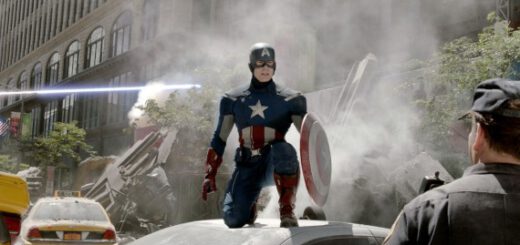John Ostrander: The Super Glass Ceiling
Well, I finally saw Captain America: The Winter Soldier this past week. Yeah, I’m a Johnny-O come lately. Got to see it in my preferred format these days, IMAX 3-D, and I and My Mary had a really good time. To me, Chris Evans’ portrayal of the Star-Spangled Avenger ranks with Christopher Reeve’s portrayal of Superman, and that’s top of the heap.
The movie also asked some interesting and morally murky questions. How far should we go to make things “safer”? CA:TWS was a political thriller as much as it was a big time action feature (and it was a big time action feature). It paid homage to its comic book roots, taking elements from comic book continuity, treating them with respect, and frequently bettering them.
There were also great performances all around. How the heck did they get Robert Redford to agree to be in it? One explanation I hear was he has grandchildren but I have to think that the other was he had a well written character and some great lines. It was a good part. Anthony Mackie made Sam Wilson/The Falcon a high flying character and more than a sidekick, as Sebastian Stan did for Bucky Barnes/The Winter Soldier. And, of course, there was Samuel L. Jackson as Nick Fury, with some choice action sequences, some twists and turns, and a persona that places him morally between Cap and the villains. He was like a male Amanda Waller and I mean that in the bad-assest way.
And then there was Scarlett Johansson as Natasha Romanoff / Black Widow. The one question I had as I left the theater (in addition to “When am I going to see it again?”) was “When are they making a Black Widow solo film?” I already knew the answer to that. She’s scheduled to be in the next Avengers outing and she might be in the next Captain America or Iron Man film but there is no solo film yet scheduled for her.
That brings us to this week’s real topic: Why the hell not?
The Black Widow is as badass as they come. She is a consummate fighter and an accomplished spy. She is beautiful, sexy, funny, and with the suggestion of an interesting backstory, she can be ruthless and can hold her own with not only S.H.I.E.L.D. but the The Avengers as well. She’s played by Scarlett Johansson, who is gorgeous and sexy and an incredibly talented and accomplished actress. What more do they want?
They’re making a movie about Ant-Man, for crying out loud. Ant-Man. And a little later this summer they’re bringing out Guardians Of The Galaxy. The previews look like fun and I’ll probably see it, but The Black Widow has got to have better name recognition and so does Ms. Johansson.
Over on the Warner Bros lot, they’re making a film featuring Superman and Batman and shoehorning in several other characters, including Wonder Woman. There is no talk of a Wonder Woman solo film. I read the studio head make a wistful, “We’d like to do it” sort of noise but, again, nothing is on the horizon.
Why the hell not?
I’ve heard the past rationales: they don’t think the audience will support it. They point to Catwoman and Supergirl as proof. Here’s an answer: don’t make a sucky superhero film. Batman And Robin or Superman Returns didn’t kill off those franchises. They gave them pause but both franchises got re-boots and started again. This time, they made good films that found an audience.
Would a movie starring a female protagonist sell? Look at Katniss in The Hunger Games movies. Tough warrior, good with a bow and arrow, complex character and the movies sell. Role model for young girls everywhere. Do they seriously expect us to believe that the Black Widow or Wonder Woman can’t do the same?
We’re left with one conclusion: Wonder Woman, for all her powers, can’t punch her way through the glass ceiling. And that’s a damn shame.



















